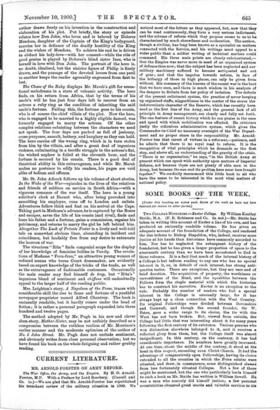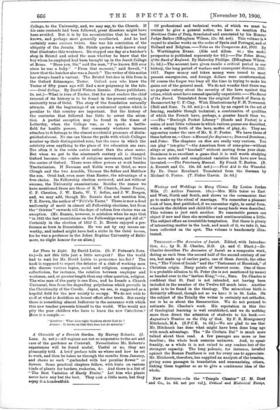SOME BOOKS OF THE WEEK.
[Under this heading we notice such Books of the week as hare not been reserved for review in other forms.] Two COLLEGE HISTORIEL—Exeter College. By William Keatley Stride, M.A. (F. E. Robinson and Co. 5s. net.)—Mr. Stride has taken in writing this account of Exeter a line of his own, and has produced an eminently readable volume. He has given an adequate account of the foundation of the College, and rendered the due tribute to Bishop Stapeldon, who, indeed, receives more justice at his hands than historians have commonly accorded to him. Nor has he neglected the subsequent history of the foundation, but be has given a larger proportion of space to the nineteenth century than we have been accustomed to find in these volumes. It is a fact that much of the internal history of a College is but tedious reading to any one who has no special interest in it, or, in default of such interest, has strong anti- quarian tastes. There are exceptions, but they are rare and of brief duration. The acquisition of property, the worthiness or unworthiness of the Head, and the squabbles between the Fellows form the staple material with which the historian has to construct his narrative. Exeter is no exception to the rule. Probably the number of readers who feel a special interest in the College is unusually large, for it has al ways kept up a close connection with the West Country. Its original Fellowships were divided between Devonshire and Cornwall, and though the second founder, Sir W, Petre, gave a wider range to ite choice, the tie with the West has not been broken. But, viewed from outside, the College had little that was interesting about it for many years following the first century of its existence. Various persons who won distinction elsewhere belonged to it, and it receives a reflected glory from them, but the College itself was almost insignificant. In this century, on the contrary, it has had considerable importance. Its numbers have greatly increased. At one time, about the middle of the century, it stood at the head in this respect, exceeding even Christ Church. It had the advantage of comparatively open Fellowships, having its choice extended to all the counties in which the Petre estates were situated, and drew, in consequence, some distinguished alumni from less fortunately situated Colleges. Not a few of these might be mentioned. but the one who particularly lends himself to such a book as Mr. Stride has written is William Sewell. lie was a man who scarcely did himself justice; a few personal eccentricities obsctired great merits and valuable services to his College, to the University, and, we may say, to the Church. If his sane counsels had been followed, great disasters might have been avoided. But it is by his eccentricities that he was best known, and perhaps most generally recollected. And he had certainly some curious twists. One was his conviction of the ubiquity of the Jesuits. Mr. Stride quotes a well-known story that illustrates this weakness. He stopped one day at a butcher's shop in Bristol and asked the man whether he knew that the boy whom he employed had been brought up in the Jesuit College at Rome. "Bless you, Sir," said the man, "I've known Bill ever since he was a baby." " From that moment," said Sewell, "I knew that the butcher also was a Jesuit." The writer of this notice has always heard a variant. The Bristol butcher in this form is the Oxford fishmonger, Tester. Oxford men who knew the Tester of fifty years ago will find a new poignancy in the tale. —Oriel College. By David Watson Rannie. (Same publishers. 5s. net.)—What is true of Exeter, that for most readers the chief interest of its history is to be found in the present century, is eminently true of Oriel. The story of the foundation naturally attracts. All the beginnings of an academical system which is peculiar to this country are important. But the history of the centuries that followed has little to arrest the atten- tion. A partial exception may be found in the times of Lollardry, when the College was, so to speak, a battle- field for hostile powers. But commonly whatever interest attaches to it belongs to the almost accidental presence of distin- guished alumni. No one can blame the pride with which Colleges number up their distinguished sons, but the cases in which the celebrity owes anything to the place of his education are rare. Too often it is the arida nutria rather than the alma mater. But when we get to the nineteenth century all is changed. Oxford becomes the centre of religious movement, and Oriel is the centre of Oxford. There were other powers at work besides Tractarianism. If Newman and Keble were at Oriel, so were Clough and the two Arnolds, Thomas the father and Matthew the son. Oriel had, even more than Exeter, the advantage of a free choice. Its Fellowship election reviewed, and not without success, the University examinations. Besides the names we have mentioned there aro those of R. W. Church, James Fraser, C. P. Chretien, J. W. Earle, W. Y. Senor, and J. W. Burgon, and, we may add, though Mr. Rannie does not mention him, T. E. Brown, the author of " Fo'c's'le Yarns." There is now a dead uniformity of merit in almost all Fellowship elections, but from the " thirties " onwards till the days of reform free choice was an exception. (Mr. Rannie, however, is mistaken when he says that " in 1821 the last restrictions on the Fellowships were got rid of." Certainly in the election of 1852 C. D. Morris enjoyed a pre- ference as born in Dorsetshire. He was not by any means un- worthy, and indeed might have had a niche in the Oriel heroon, for he was a professor in the Johns Hopkins University of Balti- more, no slight honour for an alien.)







































 Previous page
Previous page